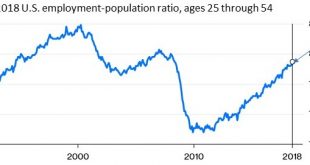(Dan here….another one from NDd) My Weekly Indicators post is up at Seeking Alpha. The old vaudeville sketch comes to mind: “Niagara Falls. Slowly I turn. Step by step ….” Not only are these weekly posts intellectually edifying, but since clicking over and reading it puts a penny in my pocket, it is the epitome of polite etiquette.
Read More »Mush versus Mush on Climate Change
Mush versus Mush on Climate Change The very long New York Times piece on climate change politics in the 1980s by Nathaniel Rich has attracted a lot of critical commentary—justifiably. To say that the failure to achieve a political response was due to human nature, a genetic defect that prevents our species from planning ahead, is just lazy and wrong. Were the scientists, environmentalists and other activists that did want to take action a bunch of...
Read More »Saturday Night News Clips
Rude Tipping How to torment the wait staff for their tip. A fun game to play on a night out with your wife or friends. The diner shared the experience on Facebook claiming his methods resulted in “the best service experienced.” Explaining at the beginning of the meal, he would place five single dollar bills on the table for the server to see and not say anything to them. If they messed up, he would take a dollar away and so on. At the end of the dinner,...
Read More »How to stay awake for economics
[embedded content] How to stay awake for economics!
Read More »Charity begins in actually giving
Via Truthout: In every community, there are nonprofit charities that serve real needs: local food pantries, programs addressing the opioid crisis, the Red Cross chapters that come to our aid after a storm. Charities provide vital services to the people and places they serve. These organizations lean heavily on volunteers, fundraisers, and donors. And most ordinary donors give without consideration of a tax break — people give their time, treasure, and...
Read More »June real trade balance
When the second quarter real GDP report was published I saw that trade made a major contribution to growth — exports contributed 1.12 percentage points of the 4.1% real GDP growth. But that seemed like some sort of fluke produced by unusual conditions rather that what trend growth would generate. Moreover, the BEA estimate was based on only two months actual data and the other month was a BEA “guesstimates”. So new data was quite likely to generate...
Read More »Open thread Aug. 3, 2018
“Paid Off” A Noir Style Game Show to Pay off Student Loans
I do not know what generation Maxwell Strahan of Huffpost is of; but if he is of the Millennials, he has it correct in his HuffPost article. . . “The Greatest “Crisis of My Generation is Now a Dystopian Show.” The crisis? Student Loan debt, the penalties associated with it, and the inability to declared bankruptcy are the greatest crises facing younger generations and will also be for this nation when millions of them default. The Show? “Paid Off!”...
Read More »Polling the Left Agenda — Finally
Click this link. Data For Progress decided to ask people about policy proposals which very serious centrists consider way too far left for America. American voters respond differently. As should already be clear from existing polls (click and search for “fair”), there is strong support for egalitarian populist redistributive public policy. At Data For Progress, they chose to emphasize the positive — four proposals with overwhelming support, but I think...
Read More »Midyear update: long leading forecast through H1 2019 at Seeking Alpha
(Dan here…I thought I should pass this along for NDd) by New Deal democrat Midyear update: long leading forecast through H1 2019 at Seeking Alpha My midyear update of the 8 long leading indicators, taking the forecast all the way through the middle of next year, is up at Seeking Alpha.Not only is it informative, but I get a few pennies if you click and read it. So click and read it! Btw, I don’t have a lot to add to whatever you’ve read elsewhere on the...
Read More » The Angry Bear
The Angry Bear


